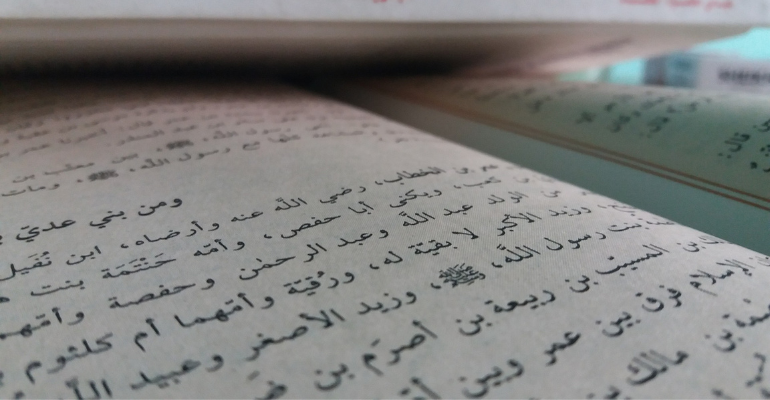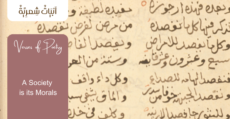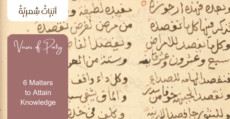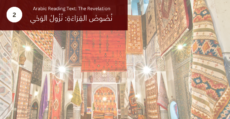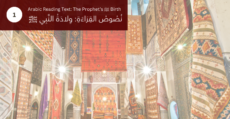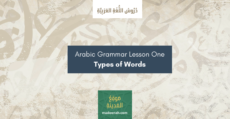Whilst every effort has been made to render this translation from it’s original Arabic source to English, one must appreciate the rich nature of the Arabic language and how difficult it can be to accurately capture the true essence of the Arabic text in any language. Allaah (Subhaanahu wa Ta’aala) says:
{Verily, We have sent it down as an Arabic Qur.aan in order that you may understand}.[1]
This book[*] and any other book translated from Arabic should never allow the reader to become complacent and hold back from learning the Arabic language, ever! Rather, it should only serve a temporary purpose in assisting the student of knowledge on his way until he has attained his goal in having learnt the Arabic language.
When I began my Arabic language studies at the Islaamic University of Madeenah back in 1993, I remember being interviewed by Dr. V. Abdur-Raheem[2] to assess the level of my Arabic knowledge so as to ascertain exactly which class he should enrol me into; It was then that I sought his advice by asking him the question every Arabic language student[3] asks:
O Shaykh! What is the best way to learn Arabic?
– whereupon he advised:
Arabic is not learnt by simply memorising the grammatical rules, rather, Arabic is learnt through necessity…
– thereby guiding me to restrict my speech to the Arabic language as much as possible despite having just started my studies, wAllaahul-Musta’aan!
Poignantly, I recall a popular story our fellow Pakistani students at the University narrate about Shaykh Ihsaan Ilaahi Zaheer[4]. When the young Shaykh arrived at the University as a student he was allocated a room in Building No.2 – which back then accommodated 6 students to a room. Upon discovering all his room mates were fellow Pakistanis he promptly made his way to the Dean of Student Accommodation and filed a complaint stressing that he had come to the University to learn the Arabic language and putting him in a room full of his fellow countrymen was detrimental to his efforts. He politely requested that he be placed in a room full of Arabs, whereupon his request was granted!
Subhaa-nAllaah! Just listening to his Arabic audio lectures is testimony to his mastery of the language.
Imaam ash-Shaafi’ee said[5]: ‘The language which Allaah favoured was the Arabic language as he revealed his Noble Book in this (Arabic) and he made this the language of the seal of the prophets Muhammad. And that is why we say that it is befitting for everyone who has the ability to learn Arabic – that they learn it, as it is the best language.’
So, just imagine how much you have enjoyed reading a translated book; Now imagine how richer your experience would be if you were to read the original in Arabic!
Regarding the student of knowledge, Shaykh al-Albaanee was asked[6]: Is it obligatory upon a student of knowledge to learn and communicate in the Arabic language?
And the Shaykh responded: Learning the Arabic language is an obligatory matter, as has been determined by the scholars, that:
If an obligatory act [A] requires you to undertake a secondary act [B] in order to fulfill the obligatory act [A], then that secondary act [B] becomes obligatory.
[That said], it is not possible for a student of knowledge to understand the Qur.aan and the Sunnah except by means of the Arabic language.
As for communicating in Arabic, then it is from the recommended acts, since there is no evidence to suggest its obligation.
Likewise, Shaykh ‘Uthaymeen was asked[7]: It is apparent that many students of knowledge steer away from perfecting the rules of the Arabic language (grammar); Considering it’s importance – what is your point of view?
And the Shaykh responsed:
Yes, understanding the Arabic language is important, whether it be the rules of i’raab or the rules of balaaghah, all of these are important. However, based upon us being Arabs, and all Praise is for Allaah, then it is possible to learn without knowing the rules of the Arabic language. However, from that which is complete (and better) is for a person to learn the rules of the Arabic language. So, I encourage the learning of the Arabic language with all it’s rules.
Likewise, Shaykhul-Islaam Ibn Taymiyyah (rahima-hullaah) said[8]:
It is known that Arabic is Fard ‘alal-Kifaayah and the Salaf would discipline their children for making grammatical mistakes. Due to this, we are ordered, whether it be an obligation or a recommendation, to preserve the Arabic (grammatical) rules, and to correct the tongues that have deviated from the correct speech. By doing so, we preserve the methodology of understanding the Qur.aan and the Sunnah. We also preserve the following of the Arabs in their manner of (correct) speech. If people were left with their grammatical mistakes, this would be considered a great deficiency and despicable mistake.
Shaykh Ibn ‘Uthaymeen was also asked[9]: Baara-kAllaahu Feekum, is the fact that the Qur.aan was revealed in the Arabic language a justification or an excuse for non-Arabs (for not acting upon it) due to it not being revealed in their language?
The Shaykh responded:
No, non-Arabs do not have an excuse or a justification in that the Qur.aan is not in their language; Rather it is upon them to learn the language of the Qur.aan, because if understanding the Book of Allaah or the Sunnah of the Messenger of Allaah (sal-Allaahu ‘alayhe wa sallam) is dependant upon learning the Arabic language, then learning Arabic becomes waajib. This is because every action that has to be carried out, in order to be able to perform an obligation, acquires the ruling of being obligatory [or – All actions which if not performed first, an obligatory act cannot be performed, acquire the ruling of being obligatory (even if they are not an obligation within themselves, such as walking to the masjid for Salaatul Jamaa’ah (for men), since one cannot perform jamaa’ah in the masjid unless he walks there, the act of walking in order to get to the masjid becomes waajib upon that individual, and so on…)].
Allaah (Subhaanahu wa Ta’aala) says:
{And I created not the jinn and mankind except that they should worship Me (Alone).}[10]
In this aayah, Allaah (Subhaanahu wa Ta’aala) has clearly defined the purpose of our creation – our purpose in this life, and outlined the means which shall assist us upon this path in the Noble Qur.aan and the authentic Sunnah – both of which originate in the Arabic language.
Considering this simple, yet essential fact, should provide us sufficient incentive to allocate time from our busy lives to learning Arabic which will subsequently open the doors to acquiring greater knowledge of this blessed religion of ours.
And what greater means to seeking knowledge can there be than to humble ourselves and sit at the feet of the inheritors[11] of the Prophets – the Scholars of Ahlus-Sunnah – and take directly fom them!
And as we take from them, we do so in order to worship our Lord upon sound knowledge, as Allaah (Subhaanahu wa Ta’aala) says:
{Say: “Are those who know equal to those who know not?”}[12]
So he who worships Allaah upon sound knowledge will find great delight and immense pleasure in his worship, as opposed to he who worships Allaah without sound knowledge.[13]
Therefore, as we pursue this noble path, let us recall the words of the Messenger of Allaah (sal-Allaahu ‘alayhe wa sallam) who said in this regard:
«Whoever treads a path in search of knowledge, Allaah will make easy for him the path to Paradise»[14]
…the ultimate reward!
I close my sincere advice with the case of a sister who strived and struggled to learn the Arabic language, despite the odds; Despite maintaining a 24-hour routine with her husband, both caring for their two terminally ill children with Batten’s disease, Zakkee – 12 and Zahraa – 10, she still found time to pursue her passion for learning the Arabic language.
Her care shift would finish daily at midnight when I would visit her to teach her for up to an hour, and after I left, she would revise what I had taught her until 2am when she would go to sleep. She would be up again for the Fajr prayer and then resume her care shift at 8am.
My Sister, Umm Zakkee (rahima-hAllaah), died of breast cancer in the early hours of Saturday 16th Ramadhaan (1st December 2001) at the age of 35 years; Please remember her in your prayers.
May Allaah (‘Azza wa Jall) permit her notes[15] to benefit all who seek to learn the Arabic language, and may He (‘Azza wa Jall) cleanse my Sister of her sins and reward her with al-Firdows al-A’laa[16], aameen.
Footnotes
[*] This advice has been taken directly from that which was printed in “The Book of Knowledge” as well as “Islaamic Legal Rulings Related to Hajj & ‘Umrah”
[1] The Noble Qur.aan – Soorah Yoosuf, Aayah 2.
[2] Author of the popular Duroos al-Lughatil-’Arabiyyah li-Ghayr an-Naatiqeen bihaa – Madeenah Arabic series of books, and at the time, Supervisor of the Institute of Arabic Language at the University. The Shaykh is currently the Supervisor of the Translation Department at the King Fahd Qur.aan Printing Complex in Madeenah.
[3] My personal study notes prepared during my Arabic language studies at the Islaamic University of Madeenah and more study material – are all available for free download at http://www.fatwa-online.com
[4] Born on 31 May 1945. He studied in Jaami’ah Islaamiyyah Gujranwala and Jaami’ah Salafiyyah Faisalabad. He then started teaching and giving weekly khutbahs up until he left for Saudi Arabia. He studied at the Islaamic University of Madeenah and graduated from the Faculty of Sharee’ah. During his final year at the Islaamic University of Madeenah, Shaykh ‘Abdul-’Azeez Ibn Baaz asked him to deliver lectures on the Ahmadiyyah – this is a very rare achievement. His book on the subject was then printed in Madeenah, but the young Shaykh wished to include in the book “Graduate of the Islaamic University of Madeenah” – before he had actually graduated! So he asked Shaykh Ibn Baaz, who was the Chancellor at the time and he agreed to it. The young Shaykh then asked Shaykh ‘Ibn Baaz: “What if I fail my degree?” Shaykh Ibn Baaz answered: “I will close the University!” Upon graduating, he returned to Pakistan and pursued further education and received degree classifications of M.A.s in Arabic, Islaamic Studies, Urdu and Farsi.
He was taught by some of the major scholars of our time – namely: Shaykh Abdul Azeez Ibn Baaz, Shaykh Muhammad al-Ameen ash-Shanqeetee, Shaykh ‘Abdul-Muhsin al-’Abbaad, Shaykh ‘Atiyyah Muhammad Saalim, Shaykh Haafidh Muhammad Ghondalwee, Shaykh Abul-Barakaat Ahmad and Shaykh Muhammad Naasir-ud-Deen al-Albaanee.
He died on 30 March 1987, at the young age of 42; Shaykh ‘Abdul-’Azeez Ibn Baaz led his funeral prayer in Riyadh, and the secondary prayer in al-Masjid an-Nabawee in Madeenah was attended by thousands. He was buried in the graveyard of al-Baqee’ in Madeenah.
[5] Iqtidaa Siraatil-Mustaqeem – Volume 1, Page 521.
[6] Fataawa ash-Shaykh al-Albaanee fil-Madeenah wal-Imaaraat – Page 35.
[7] Kitaabul-’Ilm – Page 145, Question No.42.
[8] Majmoo al-Fataawa – Volume 32, Page 252.
[9] Fataawa Noor ‘alad-Darb – Translated by Abu Abdul-Waahid Nadir Ahmad.
[10] The Noble Qur.aan – Soorah adh-Dhaariyaat, Aayah 56.
[11] Saheeh al-Bukhaaree, Sunan Abee Daawood/3641, Sunan at-Tirmidhee/2682, Sunan Ibn Maajah/223, Musnad Ibn Abee Shaybah/47, Musnad Ahmad/21715, Sunan ad-Daarimee/354, Saheeh Ibn Hibbaan/88: «…and certainly, the Scholars are the inheritors of the Prophets…».
[12] The Noble Qur.aan – Soorah az-Zumar, Aayah 9.
[13] Shaykh Ibn ‘Uthaymeen – Fat.h Dhil-Jalaali wal-Ikraam bi-Sharh Buloogh al-Maraam, Book of Purification – Pages 41-42.
[14] Saheeh Muslim/38, Sunan at-Tirmidhee/2646, Sunan Ibn Maajah/223, Musannaf Ibn Abee Shaybah/26117, Musnad Ahmad/7427, Musnad al-Bazzaar/9128.
[15] “Umm Zakkee’s personal study notes to Dr. V. ‘Abdur-Raheem’s ((Lessons in Arabic Language)) – Book 2; [as taught at the Islaamic University of Madeenah]” – available for free download at https://www.fatwa-online.com
[16] al-Muntakhab min Musnad ‘Abd ibn Humayd/182, al-Ahaadeeth al-Mukhtaarah aw al-Mustakhraj min al-Ahaadeeth al-Mukhtaarah mimmaa lam Yukharrijhu al-Bukhaaree wa Muslim fee Saheehayhimaa/394, Mawaarid ath-Thamaan ilaa Zawaa.id Ibn Hibbaan/2434: «…and if you ask Allaah, then ask Him for al-Firdows al-A’laa».

